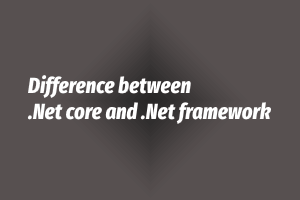.NET Framework and .NET Core are two different versions of the .NET platform. Both platforms are used to develop applications for Windows, macOS, and Linux. However, there are some key differences between the two platforms.
Target audiences
- .NET Framework is designed for desktop applications and Windows-based services. It is a complete development platform that includes a compiler, runtime, and a variety of libraries and frameworks.
- .NET Core, on the other hand, is designed for cloud-based applications and microservices. It is a lightweight platform that is focused on performance and scalability.
Programming languages
.NET Framework supports a wider range of programming languages than .NET Core. In addition to C#, .NET Framework also supports Visual Basic, F#, and C++. .NET Core, on the other hand, only supports C# and F#.
Libraries and frameworks
- .NET Framework comes with a wider range of libraries and frameworks than .NET Core. This is because .NET Framework has been around for longer and has had more time to accumulate libraries and frameworks.
- .NET Core, on the other hand, is a newer platform and is still under development. As a result, it has a smaller selection of libraries and frameworks.
Performance (.NET Core vs .NET Framework)
- .NET Core is generally faster than .NET Framework. This is because .NET Core is a newer platform that has been designed to take advantage of newer hardware and software technologies.
- .NET Framework, on the other hand, is an older platform that was designed for older hardware and software technologies.
Deployment
.NET Framework is a more complex platform to deploy than .NET Core. This is because this Framework requires a larger number of components to be installed. .NET Core, on the other hand, is a lightweight platform that can be deployed more easily.
EOL (End of Life)
- .NET Framework: Microsoft has announced that .NET Framework 4.8 will be the last major version of the .NET Framework. Support will continue, but no new features will be added.
- .NET Core (Now .NET 6 and Later): .NET 6 and later are the future of .NET development. They receive regular updates and are the recommended choice for new projects.
Conclusion
- .NET Framework is a more comprehensive development platform than .NET Core. It supports a wider range of programming languages, libraries, and frameworks. However, it is also a more complex platform to deploy and use.
- .NET Core, on the other hand, is a lightweight platform that is focused on performance and scalability. It is a good choice for cloud-based applications and microservices.
Which platform should you use?
The best platform for you depends on your specific needs. If you are developing a desktop application or Windows-based service, then .NET Framework is the best option. If you are developing a cloud-based application or microservice, then .NET Core is the best option.
If you have skills in PHP programming and you want to enhance your career in this field, a PHP certification from StudySection can help you reach your desired goals. Both beginner level and expert level PHP certification exams are offered by StudySection along with other programming certification exams.




